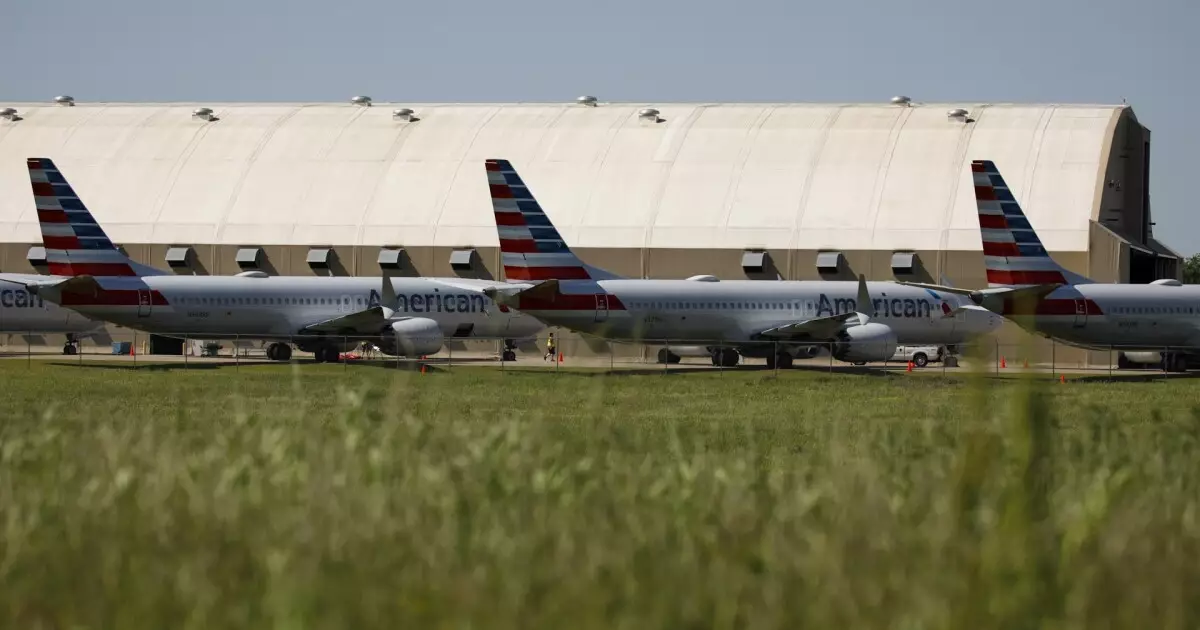Recent developments surrounding a $350 million junk-rated bond issue for American Airlines’ maintenance facility in Tulsa, Oklahoma, open a Pandora’s box of implications and reflections on the broader financial and operational dynamics of the airline industry in this post-pandemic era. The bonds, intended to rejuvenate the Tulsa International Airport’s maintenance base, do not merely reflect a routine financial decision; they signal a profound intersection of public trust and corporate dependence. As we peel back the layers, it becomes clear just how precarious this situation is for all parties involved.
Why Junk Status Matters
The essential characterization of these bonds as “junk” speaks volumes. It’s not just a label; it’s a stark warning about the volatility associated with American Airlines, which has already been grappling with immense financial strain post-COVID-19. The downgrade to B-plus by Fitch Ratings and its implications regarding recovery value highlight a concerning risk for investors. While the airlines’ essential services do grant some level of operational security, the very notion that these bonds are backed by subleases with expiration dates creates a ticking clock for stakeholders.
In a broader context, it begs the question of whether we are witnessing a misallocation of resources—half-hearted investments in institutions that should ostensibly be pillars of stability. The bonds’ junk classification risks diluting investor confidence in municipal bonds, an arena where stability should reign.
Tuition on Bailouts: Corporate Welfare?
Let’s not mince words: American Airlines’ desperate push for financial inflow sets a dangerous precedent. The $22 million in state funds from Oklahoma’s Business Expansion Incentive Program is ostensibly a boon for the Tulsa community; however, it perpetuates the troubling trend of corporate welfare. This scenario raises ethical questions: Should taxpayers contribute to revitalizing a corporation that has long since entrenched itself in systemic mismanagement and bankruptcy strategies?
Financially, bailouts and incentives might seem appealing in the short term, but they foster a dangerous dependency. Our state budgets must not cater to businesses that gamble recklessly, burdening citizens while encouraging corporations to sidestep accountability. It’s essential to evaluate if this funding paves the way for genuine enhancements or merely acts as a Band-Aid on a laceration that requires stitching and care.
The Risk-Benefit Gamble for Investors
Investors must realize that purchasing bonds tied to a troubled airline is akin to playing an intricate game of poker, where the stakes are anchored to a shifting industry. The uncertainty embedded in recovery values if American Airlines were to reject its lease in a bankruptcy scenario is indeed a precarious gamble. The bondholders may cling to assurances provided by Fitch, yet these themes bring forth discomfort among seasoned investors who understand that such promises are often as fragile as the structures they support.
Moreover, while there’s a glimmer of relative optimism regarding recovery expectations when compared to unsecured debt, how solid is that optimism really? As S&P Global Ratings remains silent with their evaluation, investors remain in the even darker shades of uncertainty.
Shaping the Future: A Call for Transparency
A pivotal component missed in this discussion is the substantial need for transparency in corporate dealings, particularly when taxpayer funds are at stake. Transparency in financial documents helps ensure that stakeholders can make informed decisions. The partnership between Tulsa Municipal Airport Trust and American Airlines should be scrutinized and examined; the velocity of capital flow requires responsibility on both ends.
Citizens must advocate for open forums where the implications of such investments are discussed candidly, allowing space for public discourse on whether these funding structures serve their intended purpose. Are we merely entering into a cycle of repeating the same mistakes, or can we pivot to a more sustainable and accountable framework as our guiding principle?
In the context of American Airlines, this bond deal is not just a financial transaction; it embodies a narrative of insecurity, dependency, and an urgent call for a more prudent and transparent approach to public-private partnerships in the aviation sector. As stakeholders, it is paramount to recognize the weight of our investment decisions—not just in raw numbers, but in the belief systems they perpetuate within our economy.

